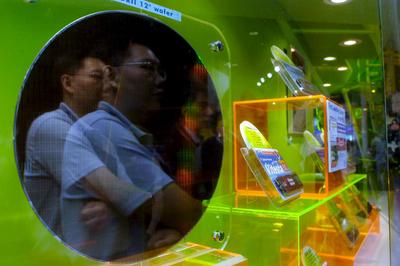So anxious is the Taiwanese government that Minister for Economic Affairs Shih Yen-shiang urged the public to buy more HTC smartphones.
The government’s cheerleading effort is understandable, as Taiwanese electronic companies like HTC have real weight in Taiwan’s export-reliant economy. In the first seven months of this year, IT and communications products showed the biggest decline among all the major export segments, contracting by 23.3 per cent — or down US$2.77 billion — from a year earlier to US$9.09 billion.
But can selling more devices alone rescue Taiwan’s information, communications and technologies (ICT) industry and the economy? The problem of HTC is a reflection of Taiwan’s ICT industry as a whole — a predominant focus on hardware manufacturing while ignoring the opportunities the internet economy has opened up.
Today, Taiwan’s internet economy lacks the kind of government attention and support that goes into its prized hardware manufacturing. This may seem logical because Taiwan is a manufacturing powerhouse, and its home-grown brand names, like HTC, Acer and Asustek, have enjoyed successes as top-tier producers of smartphones and computers.
But hardware needs software to go with it. Hardware products can only capture short-term profits, while software and content have high and sustainable profitability. Future economic growth depends on unleashing innovation across the internet enabled by the widespread penetration of PCs and smartphones. For Taiwan to achieve its next breakthrough, it needs more focus on social technology, content and entrepreneurial business models augmenting hardware devices.
Finland’s success story perfectly illustrates the capacity for innovation made possible by the internet and smartphones. While Nokia’s demise has a significant impact on the export-dependent Finnish economy, the creators of top mobile gaming apps like Angry Birds and other young internet entrepreneurs have filled the gaps and led Finland’s efforts to restart the economy.
The good news is that increasingly anyone can be an innovator — computers and the internet are empowering more and more individuals and their communities, creating economic growth and jobs from unexpected sources. In part this is because it is the most powerful infrastructure ever known for the creation, exchange and implementation of ideas. Entrepreneurs and artists can reach a global community quickly, without experiencing significant barriers to entry and relatively free from regulation. These qualities have made the internet a wellspring of innovation and an enduring source of growth.
Taiwan has the advantage of starting from an already robust internet economy, which is contributing 5.4 per cent to Taiwan’s GDP. Developing online content and services, and shifting the focus of its ICT sector from manufacturing of hardware components to other parts of the value chain, will be key to increasing the internet’s potential in Taiwan.
Such a breakthrough could create whole new industries capable of sustaining tens or hundreds of thousands of jobs. Applications stores and their availability across a growing range of mobile devices, from smartphones to tablets, are predicted to create a revenue opportunity of US$58 billion in 2014, up from US$5.2 billion in 2010. By the end of 2014, it is predicted that over 185 billion applications will have been downloaded from mobile app stores, since the launch of the first one only in July 2008.
In the US, for example, the ‘app economy’ — the new industry surrounding applications built for iPhone, iPad, Android and other mobile devices — now supports 466,000 jobs, up from zero in 2007.
The internet is also empowering artists and entrepreneurs to create content that others can access and build upon. Platforms like iTunes and YouTube have launched careers and created entirely new markets that reach a huge audience. Riding on the spread of social media globally in the last few years, South Korea has turned Korean pop music into an export success, letting the world know that it is more than a maker of Samsung mobile phones.
There are encouraging signs that Taiwan is moving in this direction. In 2011, Taiwan’s Industrial Development Bureau established the App Incubation Centre, which is working with domestic companies to transform Taiwan into the hub for Chinese-language app creations by producing 20,000 apps each year. The bureau predicts that the output value of the country’s digital content industry will grow to NT$780 billion (US$24 billion) in 2013, as Taiwanese companies tap into the worldwide mobile app supply chain.
The big question for Taiwan is whether it can act quickly enough to fully realise the benefits now available with the internet, mobile devices and IT-enabled business processes. Governments would be wise to pursue structural economic reforms that aim to incorporate key qualities that have made the internet such a vibrant source of innovation in key sectors of the macroeconomy. Taiwan is most likely to benefit if government, industry and users work together to support and champion entrepreneurs and businesses to use the internet in new and innovative ways to derive significant economic, social and cultural impacts from it. For this to happen, Taiwan needs the right policy environment that encourages a culture of innovation and improves digital literacy. The real breakthrough for Taiwan will not be to establish the next HTC, but to build the next Angry Birds.
Andy Yee is a policy analyst for Google in Asia Pacific. He has worked at the Political Section of the EU Delegation to China in Beijing.

